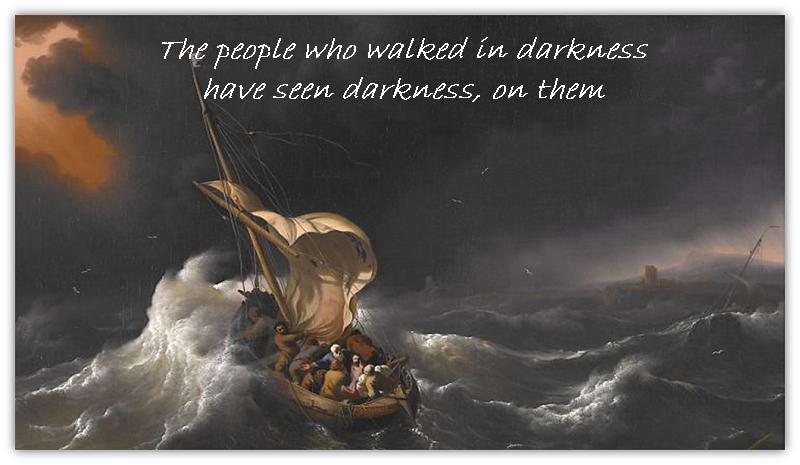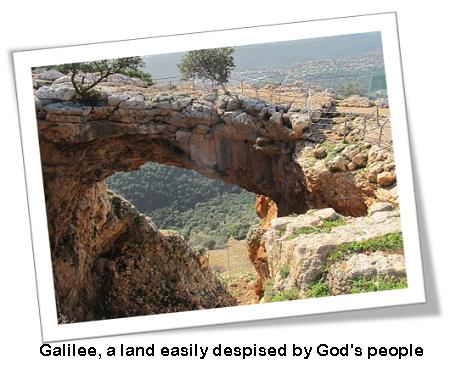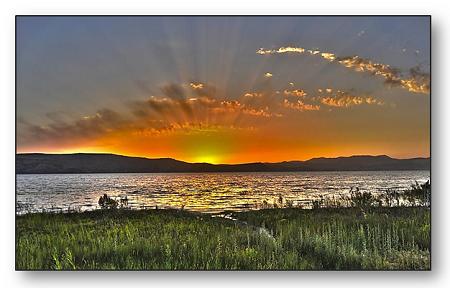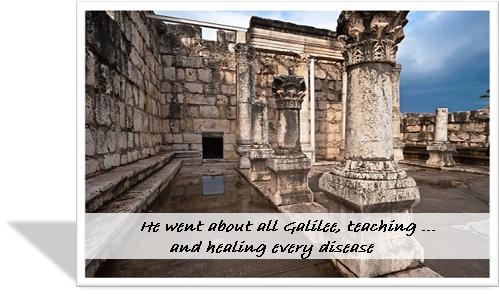The People Who Walked in Darkness...
The People Who Walked in Darkness...

Galilee in the History of Revelation⤒🔗
"The people who walked in darkness have seen darkness, on them." These words from Isaiah 9:2 are familiar to us and especially at this time of the year, the so-called "advent" time, they readily come to mind. Where was this "land of deep darkness?" According to the preceding verse, it was "the land of Zebulun and the land of Naphtali ... the land beyond the Jordan, Galilee of the nations." This last designation includes the inheritance of Asher. One can therefore say that the land referred to is the area which for the most part lies to the west and northwest of the Sea of Galilee, in the northern part of Canaan. This is the approximate New Testament Galilee.
Galilee of the Nations←⤒🔗
The characterization of this part of Canaan as "Galilee of the nations" (or, as it can also be translated, "Galilee of the Gentiles") indicates that besides Israelites, others also lived there, had their say and share in the land and so gave this area a distinctive population. However, this was not only true of Isaiah's time. Right from the beginning this territory was never completely Israelite.
Now the Lord had promised it all to Asher, Zebulun and Naphtali. It was their inheritance (Joshua 19:10-16; 24-39)! But they never went in faith destroying the Canaanite and so claiming their own possession, even though the Lord had assured them through Joshua that they would be successful (Joshua 23). Indeed, much of the land that had been gained was apparently lost again to the Canaanites after Joshua's death. To be sure, this seems to have happened to some extent with all the tribes, but with Asher, Zebulun and Naphtali, it had particularly serious long term effects. Indeed, only of Asher and Naphtali is it said that "they dwelt among the Canaanites" (Judges 1:31-33), rather than that the Canaanites were still living among them. Clearly the Canaanites were very strong and could therefore be expected to exert an influence on these Israelite tribes, with all the possible negative consequences.
The situation was less than desirable. Indicative of how strong the foreign element is that one has difficulty escaping the impression that the Israelites living in the territories of Asher, Zebulun and Naphtali do not count as much as the rest of the nation. Somehow they appear to be second class citizens, as seems evident from Solomon's treatment of part of this area.
Solomon and Galilee←⤒🔗
King Solomon was very active in building projects. A temple was constructed according to the plan of David who had also gathered much material for it (1 Chronicles 28, 29). After seven years, this magnificent house of God was finished (1 Kings 6:38).
Another thirteen years were spent on his own house. However, by this time, Solomon had clearly overreached his resources and was heavily in debt to King Hiram of Tyre, who had supplied much cedar and cypress timber as well as gold, as much as he had desired. What did Solomon then do? He "gave to Hiram twenty cities in the land of Galilee" (1 Kings 9:11). Apparently they were to be payment for his debts.

From this action of Solomon, one gets the idea that Galilee was dispensable. Although part of the inheritance and Promised Land, received from God, where covenant people lived, these cities were deeded over to the heathen King Hiram with the stroke of a pen. Galilee, a land easily despised by God's people, a land in darkness. It appears that the twenty cities included cities with a predominantly heathen population (cf. 2 Samuel 24:7) which apparently were in poor condition, probably because they were neglected within the Israelite state. Hiram was not too pleased with this payment. He said: "What kind of cities are these which you have given me, my brother?" (1 Kings 9:13). From 2 Chronicles 8:2 we can gather that he refused these cities and returned them to Solomon, who then undertook to rebuild them and settle them with Israelites. And so an important part of Galilee, a border area, was eventually (one would almost say, reluctantly) integrated as part of the kingdom. Poor Israelites who had always lived there – a people dwelling in darkness. "Second class" citizens, residing in Cabul (a derogatory term), as the cities were called (1 Kings 9:13). It is clear that One greater than Solomon was needed.
Galilee in the Northern Kingdom←⤒🔗
The situation for Galilee did not improve after Solomon's reign. With the accession of King Rehoboam, the kingdom split in two. Also Galilee was included in "all Israel" which uttered those terrible words: "What portion have we in David? We have no inheritance in the son of Jesse!" (1 Kings 12:16). The true worship of God was rejected and the Northern Kingdom plunged into apostasy. But God remembered His covenant and sent prophets, so that even in the difficult days of Ahab, there were still 7,000 who had not bowed the knee to Baal (1 Kings 19:18; cf. 18:13). The people of God dwelt in darkness. But this was especially true of Galilee.
Galilee's lot was much worse than that of the rest of the Northern Kingdom. A mere 46 years after Rehoboam's kingship had been rejected; a large part of Galilee was conquered by Benhadad, King of Syria. This king had been bribed by Asa, King of Judah, to make life difficult for the Northern Kingdom and so to take some pressure off Judah, which was being invaded by the Ten Tribes (1 Kings 15:16-20). For over a hundred years (which is about half the time that the Northern Kingdom existed!) much of Galilee remained in Syrian hands. But God remembered His covenant with Abraham, Isaac, and Jacob, and He enabled Jeroboam II to make it Israelite territory again, according to the prophecy of Jonah (2 Kings 14:25 ff. cf. 13:23).
However, although God remembered His covenant, Israel did not. God therefore warned of the coming of His covenant wrath (e.g., Amos 3-5; Hosea 4-10). This was finally executed when the entire Northern Kingdom was crushed and the people dispersed. But once again Galilee's position was special. Ten years before the Ten Tribes fell, Galilee had already been taken by Tiglath-pileser, king of Assyria, and the people led away captive (2 Kings 15:29).
The prophet Isaiah ministered in Judah at this time and these events formed the background of his prophecy in Isaiah 9:1-2:
But there will be no gloom for her that was in anguish. In the former time he brought into contempt the land of Zebulun and the land of Naphtali, but in the latter time he will make glorious the way of the sea, the land beyond the Jordan, Galilee of the nations. The people who walked in darkness have seen a great light; those who dwelt in the land of deep darkness, on them has light shined.
The grace of God! Precisely when there appears to be no future and no way out, God gives the comfort of His gospel. "The people walking in darkness have seen a great light." It is so certain that it can be described as already having taken place. One can also translate: "...will see a great light ... on them will light shine." When did this prophecy find its first fulfillment?
The people who walked in darkness, the people of Galilee in the first place, will see a great light. So certain is the fulfillment that it is described as having taken place already – "have seen a great light." When did this prophecy from Isaiah 9:2 find its initial fulfillment? In the days of King Hezekiah of Judah.

The Light Begins to Shine←⤒🔗
After the destruction of the Northern Kingdom, the Kingdom of Judah continued. Not many years later, godly King Hezekiah reopened the temple in Jerusalem (which had been closed by his predecessor King Ahaz) and reinstituted its service (2 Chronicles 29). He also invited Judah and those remaining in the Northern Kingdom, including Galilee, to celebrate the Passover Feast. Through his couriers the king urged:
O people of Israel, return to the LORD, the God of Abraham, Isaac, and Israel, that he may turn again to the remnant of you who have escaped from the hand of the kings of Assyria ... For if you return to the LORD, your brethren and your children will find compassion with their captors, and return to this land. For the LORD your God is gracious and merciful, and will not turn away His face from you, if you return to Him.2 Chronicles 30:6, 9
Here was gospel proclamation by Hezekiah, a son of David. Here was light for those in darkness!
And the believers came also from Galilee, even though they were but a few (2 Chronicles 30:11). The joy in Jerusalem was great, for since the time of Solomon there had been nothing like this in Jerusalem (2 Chronicles 30:26). The bond with the God of the covenant was reaffirmed!
In the days of Josiah light again shone for those in Galilee. This faithful king was able to assert political control over the former Northern Kingdom, including Galilee. This area was therefore also the object of his work of reformation. Galilee, too, was purged of idol worship and all that was connected with it (2 Chronicles 34:6). Light again shone to those walking in darkness! Once again a great Passover celebration was held (2 Chronicles 35:18). How the believers could rejoice in their God and His salvation!
Although these rays of light in the history of Galilee were very impressive and encouraging for the faithful remnant, it is clear that the fulfillment of the prophecy of Galilee's seeing a great light could only come in Jesus Christ. Then the light shone through the darkness of that part of the Promised Land that had been despised and pushed back and that had also been disobedient and chastised by God Himself. Also as the One who fulfilled the prophecy of Isaiah 9:2, the Lord Jesus could say:
I am the light of the world; he who follows me will not walk in darkness, but will have the light of life.John 8:12
Christ and Galilee←⤒🔗
It is touching how God involved Galilee in Christ's coming right from the beginning. O, Galilee, along with the rest of the Northern Kingdom, had once rejected the Davidic kingship and the temple in Jerusalem. But when Jesus is presented in the temple, then Galilee is there in the person of Anna of the tribe of Asher, a prophetess, who spent all her time in the temple. "She gave thanks to God, and spoke of Him (i.e., Christ) to all who were looking for the redemption of Jerusalem," (Luke 2:38). Here a representative of the remnant from Galilee rejoices at the coming of the great Davidic King. The grace of God! Galilee is also included in the Messiah's coming. He is also their Saviour.
How this fact was emphasized in Christ's ministry! Not only did the Lord Jesus spend His childhood in Nazareth (in Galilee), but He also spent most of His time preaching, healing and gathering the lost sheep of the house of Israel in Galilee. Capernaum was His headquarters, so to speak (cf. Matthew 4:13; 9:1), and His dwelling there "in Capernaum by the sea, in the territory of Zebulun and Naphtali" is expressly called a fulfillment of Isaiah 9:1, 2 in Matthew 4:14-16;"that what was spoken by the prophet Isaiah might be fulfilled: The land of Zebulun and the land of Naphtali, toward the sea, across the Jordan, Galilee of the Gentiles – the people who sat in darkness have seen a great light, and for those who sat in the region and shadow of death light has dawned."
The Messiah came to seek and to save the lost. He was not sent to minister in the first place to the high and mighty in Jerusalem who did not consider themselves as needing Christ's salvation; but, He went to the most despised part of the country, Galilee (cf. John 7:52). He went to the sorely afflicted, to the masses of mixed Jewish and Gentile population in Galilee. There the proclamation was heard: "Repent, for the kingdom of heaven is at hand!" (Matthew 4:17). It was in Galilee that the Lord called disciples (Matthew 4:18-22; Mark 2:13 ff.; John 1:43-51) and it was there that signs of the Kingdom were given. His first miracle was performed in Galilee, in Cana (John 2:1-11). Here Christ preached and healed.
And He went about all Galilee, teaching in their synagogues and preaching the gospel of the kingdom and healing every disease and every infirmity among the people. So His fame spread throughout all Syria, and they brought Him all the sick, those afflicted with various diseases and pains, demoniacs, epileptics, and paralytics, and He healed them.Matthew 4:23ff.

Here the renewal of life, the power of recreation and the dawning of the new age, was first experienced (cf. Acts 10:37), the first resurrection from the dead that of the widow's son at Nain, took place in Galilee and evoked praise to God from the people (Luke 7:14ff.). Also the resurrection of Jairus' daughter occurred in Galilee, namely, in Capernaum (Luke 8:49-55). How privileged Galilee had become! It was also there that the Sermon on the Mount was delivered (Matthew 4-7; cf. 4:23; 8:5).
Zechariah had alluded to the prophesy of Isaiah 9:1-2 when he had spoken of the corning Saviour whom his son John (the Baptist) would announce. He had said; "... the Dayspring will visit us from on high to give light to those who sit in darkness and in the shadow of death, to guide our feet into the way of peace."Luke 1:78 ff.
That surely was fulfilled in Galilee. It is included in the great work of redemption. Indeed, it is on the basis of the testimony of the "men of Galilee" that the gospel went forth. (Cf. Acts 1:11 for this characterization of the apostles; cf. also Acts 2:7.) After Pentecost, the church is also found here (Acts 9:31). The people who walked in darkness have seen a great light. By grace alone. So all God's children are included and gathered.
Final Perspective←⤒🔗
The Son of God gathers His Church, and the end result is the full number, with no one forgotten. In Revelation 7 the Apostle John writes:
"I heard the number of the sealed, 144,000 sealed, out of every tribe of the sons of Israel, 12,000 sealed out of the tribe of Judah ..." Revelation 7:4ff.
And so the list goes on. Asher, Naphtali, and Zebulun (i.e. those who lived in Galilee) are specifically mentioned. Within the history of revelation these names say something. What man may write off as worthless and not up to par, God, who is faithful and steadfast, calls to Himself. Christ came to seek and to save the lost. He gathers the complete number, and no one will be missing. All will be included in the heavenly Zion with its twelve gates on which are inscribed the names of all twelve of the sons of Israel (Revelation 21:12)

Add new comment